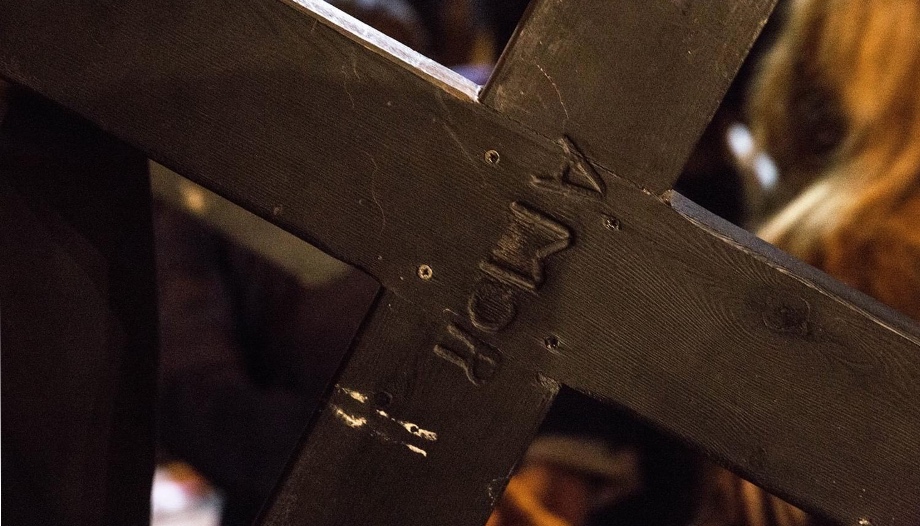There are those who believe that the brotherhoods are anachronistic, relics of the past that only interest some Catholics, perhaps the least cultivated, and that their interest is no more than purely ethnographic or as a tourist attraction.
Those who think this way start from an incorrect premise, the consideration of the brotherhoods as entities exclusively in charge of organizing more or less spectacular processional parades, accompanied by devotees -some think "extras"- strangely attired, with lighted torches. But the brotherhoods do not have that mission, they are public associations of the faithful of the Catholic Church, which entrusts them, among other purposes, the formation of their brothers or associates, to worship God, promote charity and improve society, sanctifying it from within, because the associates of the brotherhoods, the brothers, are society, they are part of it.
To focus the analysis of the brotherhoods only on the processions, acts of external and public worship, is reductive and leads to false conclusions. All the purposes of the brotherhoods are indispensable and support each other forming an indivisible whole.
The purpose of the brotherhoods is to collaborate in the mission of the Church, which is to give glory to God in its worship services; that Christ may reign, sanctifying society; to build up the Church, evangelizing.
Good internists know that the first thing they must do is to recognize the patient and identify the symptoms he or she presents in order to establish a diagnosis based on them and then propose the appropriate treatment. In more precise words, Francis explained it in his speech to the European Parliament: "It is important not to remain anecdotal; attack the causes, not the symptoms. To be aware of one's own identity in order to dialogue in a proactive way". This is how brotherhoods should proceed in their efforts to improve society, which today shows symptoms of a disease that can endanger our freedom. It is a matter of identifying the symptoms, establishing the diagnosis and initiating treatment.
These symptoms include manipulation of language, with the conviction that by changing the name of realities, they are transformed; realities are transformed microutopiesThe great utopia of class struggle is replaced by that of identity collectives with their particular list of demands; the culture woke, on permanent alert to alleged racial or social discrimination; the post-truthThe new name for what has always been called a lie; the "lie". cancellation culturewhich leads to excluding and ignoring those who do not conform to the politically correct, one that expresses itself in a way that does not imply rejection of any collective, which leads to self-censorship. All this leads to the construction of new mental frameworks for the interpretation of reality that end up being profoundly totalitarian.
What in principle are cultural trends or proposals then move on to the political sphere and from there to the legislative, thus completing the cycle of the disease, the diagnosis: relativismrelativism, which does not recognize anything as absolute and leaves the self and its whims as the ultimate measure, thus preventing the possibility of delimiting common values on which to build coexistence. Relativism is the crisis of truth when considering that the human being is not capable of knowing it; but if it is the truth that makes us free, the impossibility of knowing the truth makes man a slave.
Once diagnosed, we go to the treatment, which is contained in the mission of the brotherhoods. The celebration of worship to give glory to God is usually quite careful in the brotherhoods. Now we must focus our efforts on Christ's reign, on sanctification from within society, on building a society of free people, capable of directing their own existence, of choosing and wanting to be free. Wellto discover the most profound meaning of freedom, which is to contemplate God, the Truththus coming into possession of the Beauty.
This is not a corporate task, of the brotherhood, but of the brothers, free persons, each one acting under his personal responsibility. The brotherhood must facilitate formation so that each one lives that freedom that sustains in the strength of Faith, security in Hope and constancy in Charity.
Processions are more than a spectacle. The Crucified One in the street is a proclamation of love and freedom: "When on Calvary they shouted to him "if you are the Son of God, come down from the Cross", Christ demonstrated his freedom precisely by remaining on that scaffold to fulfill to the full the merciful will of the Father" (B.XVI).
These are the basis for analyzing the brotherhoods, which are not anachronistic but are essential for the recovery of society.
D. in Business Administration. Director of the Instituto de Investigación Aplicada a la Pyme. Eldest Brother (2017-2020) of the Brotherhood of the Soledad de San Lorenzo, in Seville. He has published several books, monographs and articles on brotherhoods.











